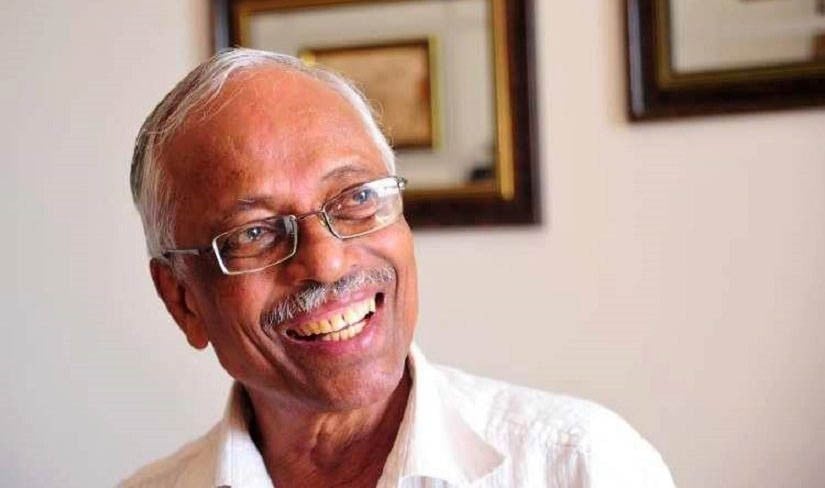
BM Kutty will be remembered for his commitment to inculcating progressive and peaceful ideals in society

Biyyathil Mohyuddin Kutty (1930 --2019) was a political activist of the Left and a great advocate of the deprived nations of Pakistan. His contribution to Baloch politics will be long remembered. To me, he was a close aide to my father, Mir Ghaus Bakhsh Bizenjo. Kutty also edited his autobiography. He was more of a family member than a friend. I am heartbroken at the demise of the veteran socialist leader who was a campaigner for peace as well as a great trade union leader.
Kutty remained a committed activist, always campaiging for peace in the region, especially between India and Pakistan.
He was born in Kerala, India and attended Mohammedan College in Chennai. It was here that he dedicated himself to progressive ideals. Kerala Students Federation was a melting pot.
Pakistan was a matter of love at first sight for him. One fine morning the young man, and some of his friends, came to Pakistan. Once here he decided to stay for the rest of his life.
He dedicated his life to the supremacy of democratic ideals in the country. He wanted to make Pakistan a welcoming country with equal opportunities for all those who decided to live here. His mission was the creation of a socialist society in Pakistan.
Kutty had a truly daring soul. As an active member of the Awami League, Azad Pakistan Party and National Awami Party, he took part in political activities during General Ayub’s ruthless regime. He was jailed in Karachi and Lahore for many years primarily for taking part in politics. Pakistani jails were then full of visionary people, like GM Syed, Hyder Bakhsh Jatoi and Mehmood ul Haq Usmani.
He was a close friend of my father, Ghaus Bakhsh Bizenjo, who was a member of the Constitution Committee formed by Zulfikar Ali Bhutto. ZA Bhutto used to frequently consult Mr Bizenjo on the future constitution of Pakistan.
At Mr Bizenjo’s request, BM Kutty prepared a comprehensive outline for the future constitution for the country. The draft reflected true democratic and secular ideals that were best suited for a country like Pakistan. At that time there was a rift within National Awami Party as Wali Khan was not ready to cooperate with Bhutto. Prof Jamal Naqvi, leader of the Communist Party, was also supporting Wali Khan. In line with the decision of the National Awami Party (NAP) convention held in Peshawar, Bizenjo decided to withdraw from the Constitution Committee. From then on Bhutto started appeasing the leadership of Jamaat-e-Islami and Jamiat Ulema-e-Pakistan. This changed the very nature of the constitution.
It was under the pressure from these parties that Bhutto had to include certain clauses referring to religion in the constitution, giving up the idea of a secular constitution.
During the NAP-led coalition government in Balochistan, Ghaus Bakhsh Bizenjo was appointed the governor of Balochistan. Kutty served him as his secretary.
Unfortunately, this government could function only for nine short months. Apparently, the federal government had been planning from the very start to dissolve it. Eventually, Bhutto dismissed the provincial government. NAP was banned in 1975 and its members were jailed on the pretext of failing to prevent the murder of Hayat Muhammad Khan Sherpao, a Pakistan Peoples Party leader.
During these testing times BM Kutty stood firm with his ideals and never betrayed his political friends. It is said that during the Pakistan National Alliance (PNA) movement Bhutto requested Kutty to pursue Ghaus Bakhsh Bizenjo for a dialogue. It was too late by then. General Ziaul Haq had had enough time to implement his plan. Martial law was imposed and Project Democracy was rolled back. The people of Pakistan were once again deprived of their basic freedoms. Kutty’s ideals were scrapped but his soul was alive.
After NAP was banned, Kutty worked with the National Democratic Party till 1979. From 1979 to 1997, he remained associated with the Pakistan National Party (PNP), founded by Ghous Bakhsh Bizenjo. PNP joined the Movement for the Restoration of Democracy (MRD) after MRD included provisions for provincial autonomy in its manifesto. Kutty was elected deputy secretary general of the MRD.
He was the man behind all the resolutions and important statements of the MRD. Kutty was arrested at the very start of the MRD protest movement and remained in jail for a year. Those who remained close to Benazir Bhutto during this movement have testified that she was very impressed with his writings.
In the 1990s, he dedicated himself to the Pakistan-India Friendship Forum. He brought all those wishing for peace between the two countries to one platform. It was through services rendered by Kutty that people like IA Rehman, Dr Mubashir Hasan and Karamat Ali became closer. It was also on account of these efforts that visa process for ordinary citizens of the two countries became easier.
Kutty was among the pioneers of the Pakistan Institute of Labour and Research. His services for the welfare of working conditions of the labour class and progressive people can only be described as indispensable.
He has to his credit remarkable contributions to peoples’ understanding of Balochistan, causes of its backwardness and the challenges it is facing in its quest for development. He was an organic intellectual of this society who was not ready to accept injustice of any kind.
To him, political activists were defenders of justice who confronted power with courage and integrity. The intellectual mission of his life was to advance human freedom and knowledge. His passing away is a huge loss for the state and society as he was a value-oriented political activist. He will be remembered for his commitment to inculcating progressive and peaceful ideals in society.
The writer is a member of the Senate of Pakistan